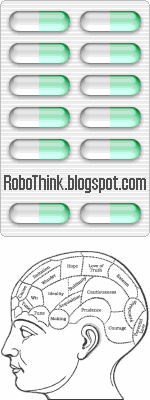I'm the neuroscientist, this evil genius
The title of this post comes from a remark by V.S. Ramachandran during his 2003 Reith Lectures for the BBC. Professor Ramachandran is Director of the Center for Brain and Cognition at the University of California in San Diego. After each of the five lectures the audience was invited to ask questions. Until recently, there were transcripts of all the Q&A sessions on the BBC site, but now they can only be found at the Internet Archive (archive.org). The following question was put to him at the end of the last lecture:
Question: If and when we fully understand the human brain, what happens to the traditional disciplines like philosophy, psychology, theology, aesthetics that thought that they studied what it was like to be human. Do they just shut up shop and go home?Like he says, that's not true, obviously. During the introductory lecture he said something which showed how easy it is for reductionist explanations to reach a dead end:
Ramachandran: Yes. But let me qualify. When you take something like love - somebody says, Oh when you fall in love, these are all the parts of the brain active: the septum is involved in orgasms, these are the peptides released, hypothalamic nuclei, then maybe there is some prolactin for affiliation - and all of this is activated. So you're in love with this young lady and I come along, and I'm the neuroscientist, this evil genius, and I do a brain PET scan or whatever, and I show these are all the parts active. This young lady friend of yours looks at it and says, My God, that's all? It's all this bunch of chemicals? What you should say is, My Dear, this proves it's all real. I really am in love with you. I'm not faking it. Here's hard evidence. So the notion that once you explain it in terms of what's going on in the neurons is somehow going to eliminate love or eliminate philosophy or eliminate psychology, that's not true, obviously.
"Even though its common knowledge these days, it never ceases to amaze me that all the richness of our mental life - all our feelings, our emotions, our thoughts, our ambitions, our love life, our religious sentiments and even what each of us regards us his own intimate private self - is simply the activity of these little specks of jelly in your head, in your brain. There is nothing else."Sensory deprivation experiments show what happens when those specks of jelly are deprived of input from the outside world. Mental activity is the outcome of experiences or sensations from the world outside. To be creative, to make plans for the future, or even to hallucinate, a person needs to have past experiences to draw on. In other words, feelings, emotions, thoughts, ambitions and religious sentiments cannot exist simply because specs of jelly exist. Still, half an explanation is better than none.

1 Comments:
Of course, when you get right down to the nitty-gritty, around 98% of the human body is made up of just 10 elements, more than two thirds being water. Hydrogen, Oxygen and Carbon make up 93% of the body, and Nitrogen, Calcium, Phosphorus, Potassium, Sulfur, Sodium and Magnesium bring it up to 97.8%.
So I can rephrase Ramachandran's statement as...
"All our feelings, our emotions, our thoughts, our ambitions, our love life, our religious sentiments and even what each of us regards us his own intimate private self - is simply the activity of these basic chemical elements!"
<< Home